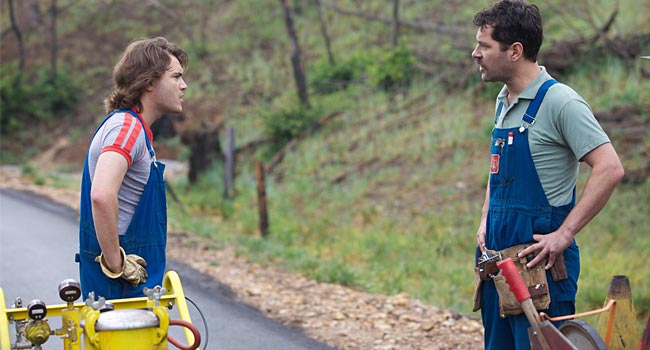
Prince Avalanche certainly seems like a step in the right direction for the director, but it’s too light and forgettable to really make any impact.

Prince Avalanche certainly seems like a step in the right direction for the director, but it’s too light and forgettable to really make any impact.
The claims that David Gordon Green is going back to his older days, where films like George Washington and All The Real Girls had him heralded as America’s Next Great Director, isn’t necessarily true. Sure, Prince Avalanche is Green’s first film in years that resembles his earlier projects, but the influence from his shift to studio pictures is just as prevalent. Even with all of the quiet, contemplative scenes this is still a very broad comedy, one that feels like a perfect middle ground between the two different sides of the director. Unfortunately, that doesn’t mean it’s a good thing.
Opening with a title card that talks about a Texas forest fire in the late 80s, the film cuts to gorgeous footage of trees being destroyed by a massive fire before showing two street workers preparing for their day. Alvin (Paul Rudd) and Lance (Emile Hirsch) spend their week walking around painting lines on a road that runs through the forest mentioned at the beginning. The job requires the two of them to be isolated from the outside world, camping out along the road during the week before heading back to town on the weekend.
Lance is the brother of Alvin’s girlfriend, and it’s evident that Alvin only hired him as a favour. Lance is a young playboy with only one thing on his mind, while Alvin prefers solitude. “There’s a difference between being lonely and being alone”, Alvin says at one point, which sums up what Prince Avalanche is about. Lance is constantly looking for a way to not be lonely, while Alvin prefers to be on his own. Both of them end up getting what they wish for, but not in the ways they imagined.

For most of this entirely whelming film, Rudd and Hirsch are usually clashing over their different approaches to life. There are some welcome detours in the narrative, one involving a truck driver (Lance LeGault) who has a never-ending supply of alcohol, and a fantastic scene with a woman (Joyce Payne) going through her destroyed home that nails a lot of what Green was trying to accomplish (and it says something that this scene was never in the script). The same can’t be said for most of Prince Avalanche.
Alvin and Lance feel broadly drawn as characters, making it hard to take either of them seriously. Rudd and Hirsch do fine in their roles, but the material they’re working with is lacking. Green’s focus on nature involves several montages of nature shots which, despite Tim Orr’s great cinematography, feel less evocative and more like padding for time. There’s a heartwarming quality to Prince Avalanche that contrasts with the themes of loneliness and depression, but there isn’t enough dramatic weight behind Alvin and Lance’s situations to make the uplifting quality feel earned.
Nonetheless, there’s plenty to admire. The late Lance LeGault is great in his minor role, and the score by David Wingo with Explosions in the Sky helps support the film’s off-kilter tone. Whether or not it’s an improvement on Either Way, the Icelandic film that Green based his script on, remains to be seen, but it wouldn’t be surprising if both films can easily stand on their own merits. For Green, a director who seemingly fell into a slump after Your Highness and The Sitter, Prince Avalanche certainly seems like a step in the right direction, but it’s too light and forgettable to really make any impact.